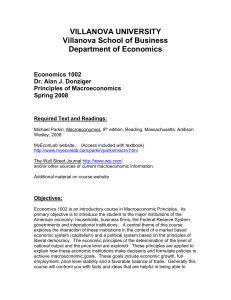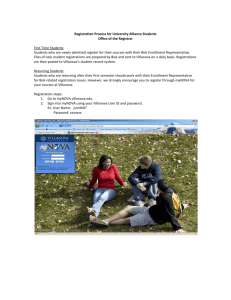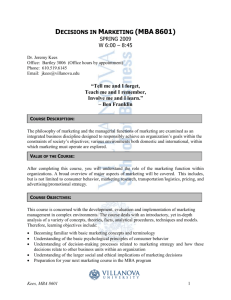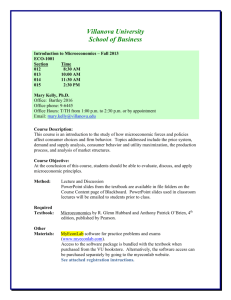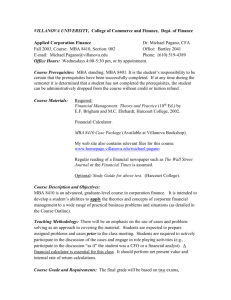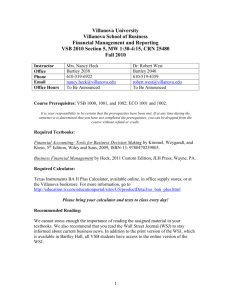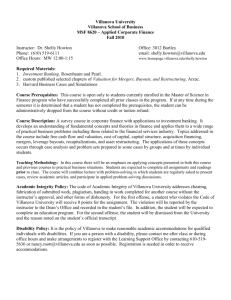Operating Policies—MBA8101
advertisement
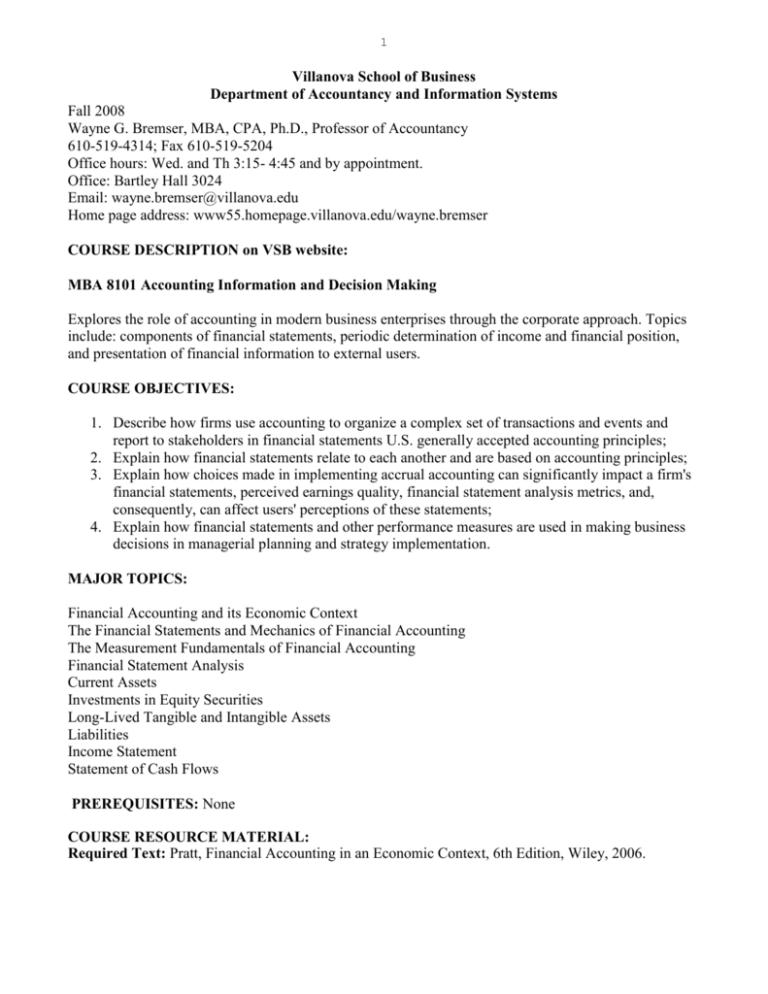
1 Villanova School of Business Department of Accountancy and Information Systems Fall 2008 Wayne G. Bremser, MBA, CPA, Ph.D., Professor of Accountancy 610-519-4314; Fax 610-519-5204 Office hours: Wed. and Th 3:15- 4:45 and by appointment. Office: Bartley Hall 3024 Email: wayne.bremser@villanova.edu Home page address: www55.homepage.villanova.edu/wayne.bremser COURSE DESCRIPTION on VSB website: MBA 8101 Accounting Information and Decision Making Explores the role of accounting in modern business enterprises through the corporate approach. Topics include: components of financial statements, periodic determination of income and financial position, and presentation of financial information to external users. COURSE OBJECTIVES: 1. Describe how firms use accounting to organize a complex set of transactions and events and report to stakeholders in financial statements U.S. generally accepted accounting principles; 2. Explain how financial statements relate to each another and are based on accounting principles; 3. Explain how choices made in implementing accrual accounting can significantly impact a firm's financial statements, perceived earnings quality, financial statement analysis metrics, and, consequently, can affect users' perceptions of these statements; 4. Explain how financial statements and other performance measures are used in making business decisions in managerial planning and strategy implementation. MAJOR TOPICS: Financial Accounting and its Economic Context The Financial Statements and Mechanics of Financial Accounting The Measurement Fundamentals of Financial Accounting Financial Statement Analysis Current Assets Investments in Equity Securities Long-Lived Tangible and Intangible Assets Liabilities Income Statement Statement of Cash Flows PREREQUISITES: None COURSE RESOURCE MATERIAL: Required Text: Pratt, Financial Accounting in an Economic Context, 6th Edition, Wiley, 2006. 2 The Pratt Book emphasizes the user perspective of financial accounting. It is clear, concise, and easy to read and includes various real-world examples to better understand accounting issues. The book is an excellent reference material that can be used throughout your business career. Readings: The professor will assign readings that will be discussed in class. Students are expected to use their Villanova email account, which can be set up to forward messages to other accounts. It is assumed that students have access to the course website on Web CT/ Blackboard. METHOD: The course will be conducted utilizing a combination of discovery learning, lecture, technology applications, in-class case/problem solving, class discussion, homework, and a team project. ETHICS and SOCIAL RESPONSIBILITY: These are considerations in virtually all business decision-making settings. Ethics and social responsibility issues will be integrated in the course. Students are encouraged to read the WSJ (print or interactive edition) and other current news sources and identify real-world ethical dilemmas to share with the class that are relevant to the course material. GLOBAL PERSPECTIVE: Effective 2008 foreign private issuers are no longer are required to reconcile to U.S. generally accepted accounting principles (GAAP) when registering with the Securities and Exchange Commission (SEC) if they adopt International Financial Reporting Standards (IFRS) as published by the International Accounting Standards Board (IASB). While the textbook focuses on US GAAP, we will incorporate an awareness of IFRS, which are principles based standards, into the course. Operating Policies—MBA8101 Policy on Attendance and lateness: This course requires active participation by students. Therefore, you are expected to attend every class, to be prepared for class discussion (by completing the assigned readings, textbook assignments, and cases), and to participate actively in class discussion Habitual lateness is a possible grading discount factor. However, I recognize the realities of being a part-time student. If your job responsibilities are the root cause of absences and lateness, please keep me informed. Grading: Your final grade in the course will depend on how your overall average compares to the class average. This is a competitive environment and your grade is primarily a result of your capabilities and effort. Each student's overall average score will be computed as follows (approximately): Exams ...................................................... 75% Teamwork, class and other assignments ......... 25% Total ....................................................... 100% We will have an in-term exam and a final exam. We will have a team project and selected homework problems may be collected. The final weights may differ somewhat, depending on how the semester progresses. No make-up exams will be given unless there are extreme circumstances. The final exam will be administered on the date/time period scheduled for this course by the Registrar's Office. 3 Class: Students should sit in the assigned seat each class to facilitate attendance monitoring and grading. Bad weather may cause a class cancellation. I will send an email if I cancel class or Villanova cancels classes. I may decide to have a distance learning class on a bad weather day. The Villanova University website will post class cancellation news. Villanova snow numbers are on KYW: undergraduate day 528, MBA 2472. Do not take bad risks to attend class in snow, icy or hurricane like conditions. The use of notebook computers and other wireless devices during class for purposes other than class work is not a good idea. Email, stock market monitoring, surfing, etc. is a distraction to classmates and the professor. Examples of acceptable use are using excel for a class problem, taking notes, and using the internet for researching a team class case or doing a web-based class exercise. If you are instructed to close notebook computers, please close them immediately. Schedule: A schedule will be provided at the first class and more detail will be provided as the semester progresses. In general, we will follow the schedule, but there will be some changes. Therefore, if you miss class please check with a teammate for any schedule modifications. I will send email updates. I will make every possible effort to keep office hours, but meetings and other professional responsibilities sometimes prevent this. I am usually in the office 10 to 15 hours per week. Exams: Exams typically consist of any combination of multiple choice, exercises, problems, and essay questions. Missing an exam for an unexcused reason may result in a zero grade for that exam. Thus, you should plan to take exams at the assigned time. Non-programmable calculators (approximate cost is $2.00) are recommended for all exams. Programmable calculators are discouraged, and their memory must be cleared before the exam (subject to inspection). It is not permissible to share a calculator during exams. The tentative class exam date and chapter coverage will be shown on the course schedule. Teamwork: Early in the semester, I will form teams (usually the first evening). In general, there will be teams of 3 to 5 students each, depending on the size of the class. In addition to completing the team assignments in this course, you are encouraged to use your group as the basis for study and assignment preparation outside of class. This is a competitive environment and your team grade is based on my ranking of team performance. Some aspects of team projects can be graded on an individual basis such as a student’s presentation and preparedness in the semester team project presentation to the class. Peer Evaluation of Contribution to Team Performance: Peer evaluations will be considered in the grading process. Free riders will not get credit for the work of others. However, we have the entire semester to have everyone contribute a fair share. If someone is lagging they can make it up by taking greater responsibilities for the remaining assignments. Someone may appear to be lagging because of group leadership problems. At the end of the semester, each student will be responsible to complete a form on which the student is requested to make a general assessment of each team member's contribution to the team projects during the semester. In arriving at your assessments, you are free to consider evaluation criteria such as initiative, creativity, leadership, etc. At times there are personal issues such as medical problems that deserved understanding and support by team members. If serious issues arise, the team should keep records on planned meetings, attendance, etc. If problems persist, the team leader should notify the professor. Statement on submission policy: Late assignments are a grading discount factor. If you hand in an assignment late, a written explanation should be attached. You may get some credit-- no guarantees. Assignments are due at the beginning of class. 4 Villanova University Policies STATEMENT ON DISABILITY: It is the policy of Villanova to make reasonable academic accommodations for qualified individuals with disabilities. If you are a person with a disability please contact the professor outside of class and make arrangements to register with the Learning Support Office by contacting 610-519-5636 or nancy.mott@villanova.edu as soon as possible. Registration is needed in order to receive accommodations. POLICY ON ACADEMIC INTEGRITY: The Code of Academic Integrity of Villanova University addresses cheating, fabrication of submitted work, plagiarism, handing in work completed for another course without the instructor's approval, and other forms of dishonesty. For the first offense, a student who violates the Code of Villanova University will receive 0 points for the assignment in question. NOTE: this College rule is stricter than the University guideline. The violation will be reported by the professor to the Dean's Office and recorded in the student's file. In addition, the student will be expected to complete an education program. For the second offense, the student will be dismissed from the University and the reason noted on the student's official transcript.
